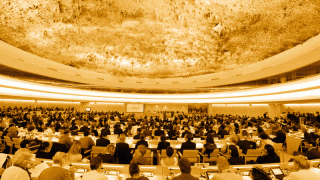In today’s world, people, goods and ideas cross borders. Problems are increasingly shared. So too are solutions. It is only through close cooperation with the international community that we will tackle the major threats we face – climate change, financial instability and the fallout from conflict – and create a positive future for the UK and the world.
We were pleased that the British Prime Minister acknowledged this in September 2018 at the General Assembly. UNA-UK agrees "we need action" to support multilateralism and the organisations like the United Nations that enable it.
But multilateralism is under attack. The concept is as fragile as it is vital. If states don’t play by the rules, they will achieve less and damage the international system that has delivered so many benefits to the UK and the wider world.
Our 2018 Global Britain Scorecard uses impartial sources to examine the UK’s contribution towards strengthening our international system across a sample of policy areas which contain opportunities for stronger UK action. We believe the scorecard represents a bellwether for the extent to which Britain is playing a positive role.
Methodology
Our methodology starts with the UK’s own analysis that Britain’s security and prosperity is underpinned by a strong, rules-based international system with the United Nations at its heart. We have chosen a number of issues where we feel particular opportunities and risks present a window on the UK's relationship to this system. We then use a traffic light system to score the UK’s performance in supporting global governance in this area as “green”, “amber” or “red”.
Impact on the rules-based international system
While acknowledging that these issues are very complex, we feel that a simple traffic lights scoring system gives a useful assessment of the UK’s direction of travel. Impartial sources and more detailed analysis accompany each score.
“GREEN” - The UK’s actions in this area are helping to strengthen the rules-based international system and serve as a positive example to other states.
“AMBER” - The UK’s record in this area is mixed; on some fronts the UK’s conduct reinforces the rules-based international system, on others, it doesn't
“RED” - The UK’s actions in this area are undermining the rules-based international system - we recommend a course correction.
Source
The score for each of the issues below has been determined using at least one impartial source that meets the following thresholds:
- A cross-party group of MPs
- A senior UN official or an official UN report
- UK attendance/voting in forums such as the UN
Civil society, particularly civil society coalitions, plays an enormously important role in informing our analysis on these issues. The analysis section of each page provides links to research and commentary from a wide range of specialist NGOs and civil society coalitions. However, given our active role in many of these networks, we do not wish to give the impression of "marking our own homework" and so we base our score purely on the three kinds of source detailed above.
Period being monitored
The scorecard reflects an assessment of current UK Government policy in the months and years up to September 2018 and will be updated annually, or when significant changes to policy occur.
By updating the results periodically, we will track the UK’s progress towards a “Global Britain”.
Links
Our 2017 policy report Keeping Britain Global makes the case for a joined-up approach to UK foreign policy.





